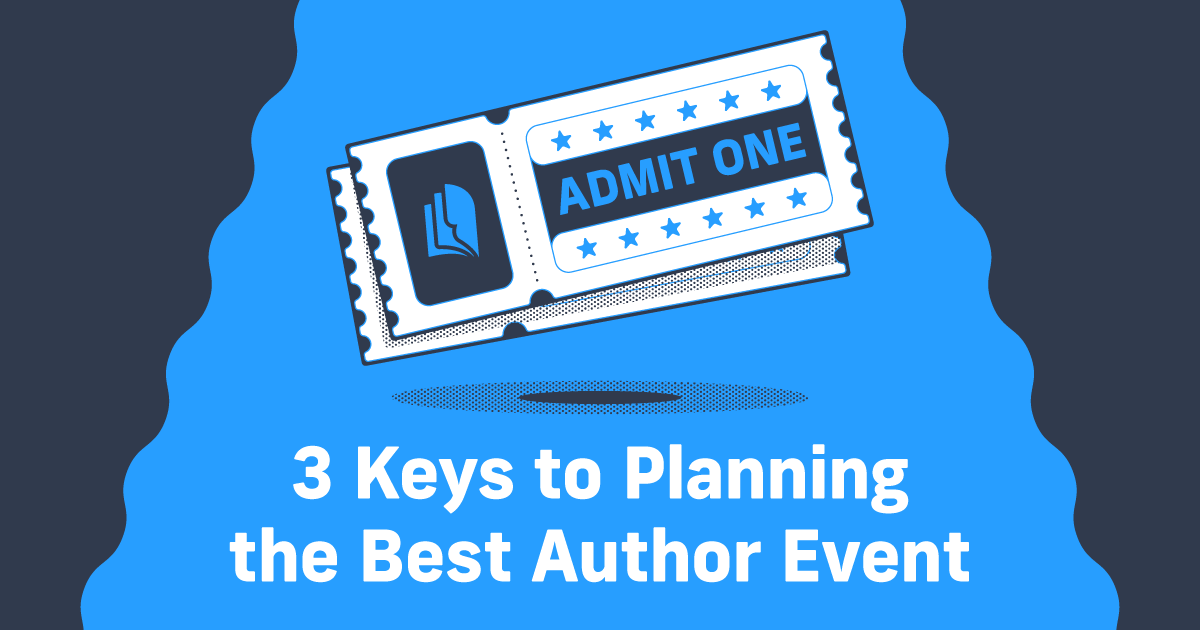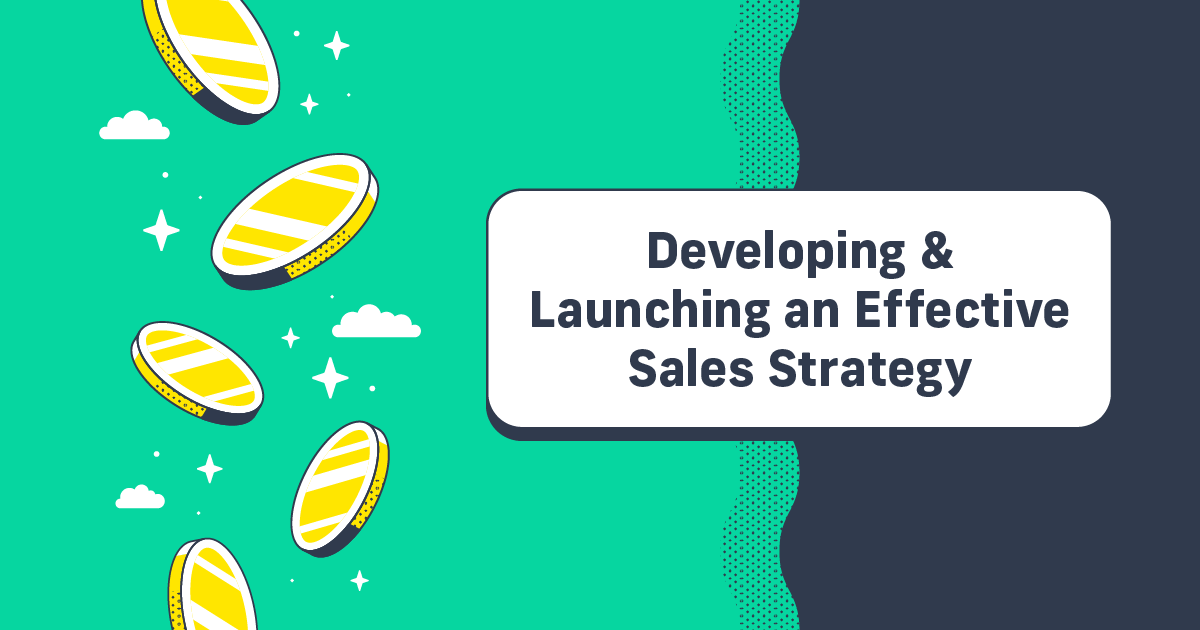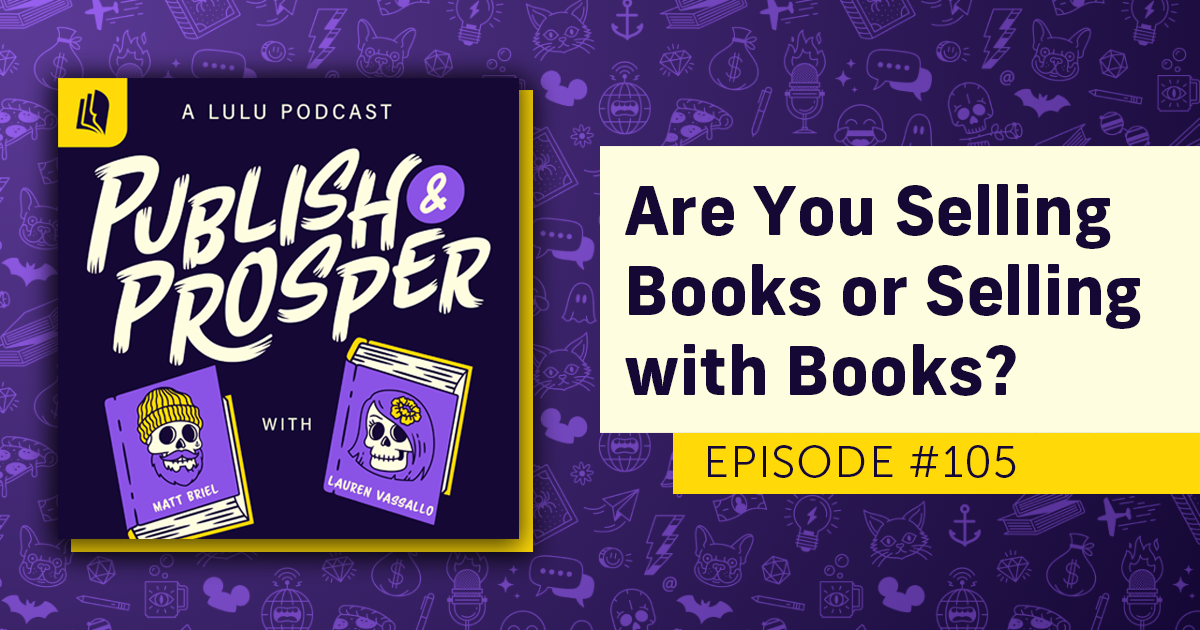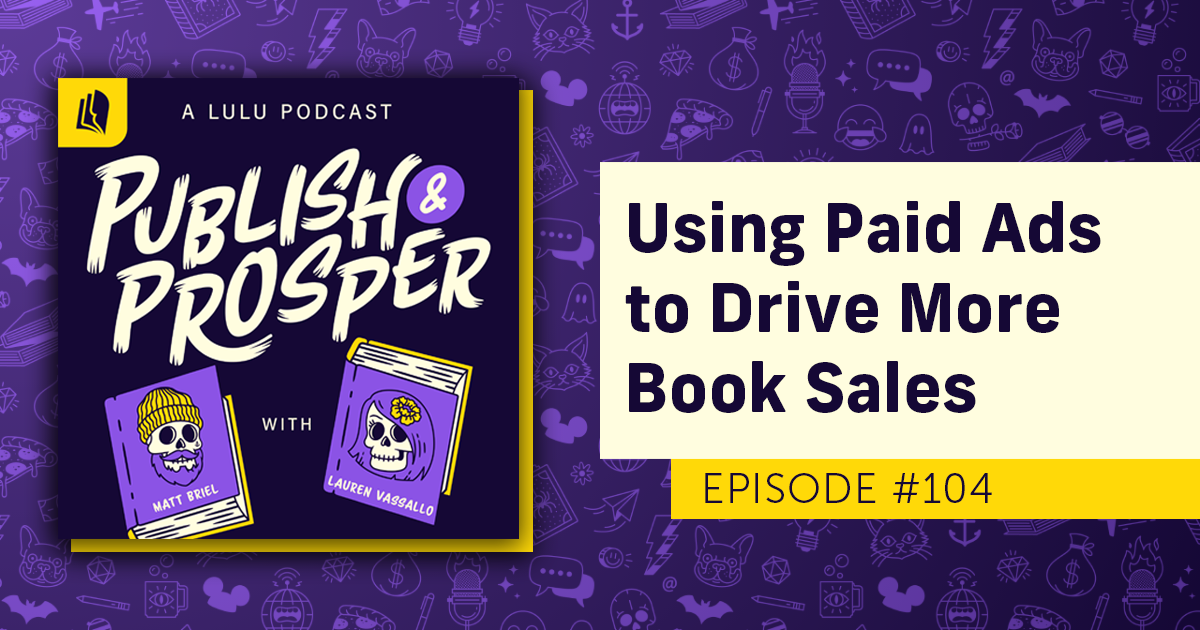3 Keys to Planning the Best Author Events
Author events are a cornerstone of all author marketing plans. Perhaps not as far-reaching or crucial as a strong social media presence or a consistent and growing author blog, the events you attend during a book launch and in the weeks and months that follow the launch are integral in cementing yourself as an author in the local community.
Historically, there are two primary kinds of author events: book signings and readings. Oftentimes, the two will overlap, and you’ll do both at a given event, but when thinking about how you’ll plan your author events, it’s wise to look at these as separate activities. That’s not to say you cannot or should not do both while promoting your book, but you want to maintain a level of focus while you plan your events.
Quickly, here are the main attributes of each type of event:
Book Signing
A signing will generally be just you, sitting at a table, signing copies of your book. Some authors will also pre-sign copies so the bookstore can offer them before, during, or after the event. The signing is a great type of event, as it sits you down face-to-face with a reader for a few moments. They can ask a quick question, tell you their favorite scene, or prod you about your next book. This all might seem tedious, but these small interactions go a long way toward creating a lasting impression.
The signing will focus on building small, incremental relationships with new and existing readers, as well as building or strengthening a relationship with the venue, in most cases a bookstore. Because signing a book naturally mandates purchasing a copy of the book, a signing is a strong selling opportunity. And because you’re self-publishing, you’ll have all the control you need to set and adjust pricing. Keep this in mind, particularly for events, and we’ll touch on it more below.
Author Reading
An author’s reading is a great means to attract new readers. Oftentimes, unless you’ve got some great connections already in place, you’ll be participating in a reading with a few other authors. While it might seem like sharing the limelight is bad, you do get the benefit of their audience in the crowd. Particularly if your book shares some common themes or genres with your fellow readers, you’ll be presenting your work before a group you know is interested in reading, and only needs to be prompted to consider your book.
The most important aspect of the Author Reading will be the content you bring. Unlike a signing, a reading will not (necessarily) be a sales-focused event. Think of it more as an opportunity to expose new readers to your work, while connecting with fellow authors to expand your writing community. For reading, you’ll want to prepare a piece to read with some very specific considerations. We’ll look at this in greater depth below.
Author Signing
Of course, events will be a combination of both reading and signing. This, too, is a beneficial thing, as you can combine the advertising power of reading an excerpt with the sales push a signed copy promotes. For that reason, I like to advise preparing as if all events will be both a reading and a signing, and bringing the necessary materials for each. Your goal is always to grow your readership, promote your author brand, and draw in new readers.
One additional event that doesn’t cleanly fit into either category is the convention or trade show. This kind of event is similar to both a signing and a reading, in that you’ll be there promoting your book (and selling copies if the event permits doing so), but you’ll also be speaking with readers
With that in mind, let’s review the three keys to successfully preparing for author events.
1. Stock Up on Books
Don’t take any chances. If you’re a self-published author, you should always keep some copies on hand to sell. How many copies is a different question, and should be based on the average you sell, how much you can afford to spend on holding books in stock, and the events you plan to attend?
During the lead-up to the event, it’s wise to question the event’s coordinator about likely attendance. How many have attended similar events in the past? What about regular customers? Any sense of how many sales authors make during these events will help inform your ordering decisions.
Remember too that Lulu prints your books on demand, so you’ll want to allow plenty of lead time when you make an order. I advocate getting your books ordered about a month before the event date. This allows a few days for printing, and a few more for shipping, and should get you the books two weeks or more ahead of the event. Why so early? Well, while we maintain an exceedingly low error rate with our printers, mistakes and misprints do happen.
Order Ahead of the Author Event
Giving yourself a buffer time, just in case, is a safe way to make sure the books you bring to sell are perfect.
Another slightly tangential point involves revisions. Lulu allows authors to revise their already published works. While this is awesome for making small updates or correcting errors, be careful if you’ve revised recently. I cannot stress enough how important it is to order and review a proof copy of the book after each revision. If you’ve recently revised and haven’t gotten a proof of the newest version, it’s a very good idea to do so before ordering a large quantity for your event.
You need to know that your book is ready, and order stock to bring to your event far enough in advance to deal with any possible errors, no matter how remote the likelihood of an error appearing.
How many books should you order? If you consulted with the event’s coordinator (or other authors who’ll be attending or have attended similar events at this venue), you should have a sense of attendance at least. You want to have enough books to cover sales, but you don’t want to be driving around with a carload of books left over. The balance you’re after will be largely reliant on your sales history, the size of the event, and your willingness to spend your own funds on books.
A good rule of thumb is to have a dozen or more books in stock at all times. For an event like an author signing, you’ll want some extra books, as each signing is dependent on having a book to actually sign. Running out of stock is great (you sold all those books!), but also a problem because you’ll miss out on additional sales. If you walk away from an event with a handful of books left, I would call that a success.
Books on Hand, but Not Too Many
Find a balance that ensures you have books on hand without creating a massive quantity of books you then have to lug around and store.
Aside from the books, there are a couple of items you’ll want to have ready. These include:
- A comfortable folding chair (or two)
- A folding table
- Book stands – at least two is my recommendation, so you can “frame” your table with a couple of displayed books
- A pen you love to write with (and a backup)
- A water bottle
Obviously, you won’t need all of these materials for all your events. For example, a reading event might feature a podium to read from, so you wouldn’t need your table to set up for selling books. Or the venue might have a table ready for author signings, so you’d only need to lay out your books. But it’s smart to have the necessary items on hand and ready, just in case.

Create Your Book
Use Lulu's free templates to easily create and publish your book today.
2. Bring Content
Yes, of course, bring books. But more than that, you have to offer something original or unique to your readers – both new and old readers – that adds some value to them. You have to make it worthwhile for these folks to come to your event.
What “content” means will depend largely on the event. For a signing, you might be more limited in the content you can offer, but I do have a few cool ideas that can help promote you and your brand. For example, if you’re doing a signing, you might think about including a preview of your next book with the current book. This is particularly useful if you’re doing a signing for a book that’s been out and available for a while.
Take advantage of the option to edit a published book (or simply create an alternate version) and add a chapter or excerpt of your next book to the end. Now the book you’re selling at the signing is unique and might prompt or help encourage readers to give your book a try!
Custom, Author Branded Goods
Another cool idea is to create a custom bookmark and add those to copies you sell at the signing. This is a simple addition that can be created and purchased for very little investment through a variety of online options. I love bookmarks as supplemental marketing items. They’re simple and low-cost, so you can hand them out without much concern about converting each bookmark to a sale. And there’s ample space to show an image of your book, some text, and maybe even a link to your author site or the Lulu page for your book!
For a reading, the content you’ll bring will obviously be the excerpt you read. Don’t slack on making a decision about what you’ll read. Think about the audience you’ll likely be in front of; are they new readers? Or a fair number of readers familiar with your work? Does the reading have a theme? What kind of venue is it? A bookstore? A cafe, a hall, or an auditorium?
Mull over those questions while you select a passage. Keep in mind that you should aim for at least five minutes of actual reading, and less than ten minutes. You don’t want to skimp on the content, but you also don’t want to drone on. Again, look for a balance.
Content to Share
Simply picking a passage isn’t enough either. You need a passage that highlights you, your story, and the main character(s), and tells something close to a complete story without requiring much (if any) background. Once you’ve settled on a passage, I suggest printing it out and reading it aloud multiple times. How does it sound? Be extra conscious of dialogue, as what works when reading silently in your head may not work as well when you’re reading aloud.
There is nothing wrong with editing your passage lightly to ensure it sounds good when you’re reading it aloud. Once you have a “reader” draft of your passage, try to read it aloud to a friend or family member a couple of times. Note how long it takes to recite the passage and control your pace. You don’t want to rush, but nor do you want to crawl. Balance. If the scene is full of action, make sure you are capturing that feeling in your reading. If the scene is introspective, bring that tone to your reading.
Author Convention
Finally, the convention event. This kind of venue is different because you’ll primarily be conversing directly with individuals, rather than addressing a crowd. You’ll have the opportunity to get in front of a huge number of potential readers, and if the convention allows selling, you absolutely should bring plenty of stock to offer. If the venue doesn’t allow selling, bring bookmarks or even business cards with information and a web address to purchase from. Regardless of your retail options, your goal is to make an impression.
Convention-goers are going to accept and accumulate a staggering amount of stuff during the event. You need the thing they get from you to stand out. What that thing is, I can’t honestly say. But here’s an example from Lulu: We go to a lot of author and publishing events. Over the last year, we’ve been bringing simple notebooks with us. With a custom-designed cover, a couple of pages at the beginning about Lulu, and then a normal lined notebook. For us, this is a low-cost marketing option that stands out next to a pile of business cards, and has a use – people can write in it! We consistently see convention-goers stopping at our booth, asking about the notebooks, excited that we’re offering something a little different.
Think like this. Giving away a book might not be financially feasible, but you want to think of something that does fit your budget and allows you to stand out from the crowd. It’s not easy, and anything you do will be a bit of a gamble, but remember that a convention event is not primarily about making sales. You want to spread the word. A convention is a long-game investment.
3. Set the Right Expectations
Okay, so you are all booked for the event, you’ve got your book ready to go, and you’ve got an order in with Lulu for a box of books. Are you ready for this, right? Almost.
The last key element is stirring up interest among your followers and readers and setting solid expectations. Get your existing readers interested in the event. Using your email and social followers to get the word out is a must, and well-done social campaigning should result in some sharing on various social media platforms. Be sure to go and share the event page and posts from the venue on Facebook and Twitter.
And while you’re doing all of this, you’re setting expectations for your readers. Participating in a reading? Let folks know that’s what you’ll be doing. And if you’re reading something new, tell them! Selling signed copies? Let people know! Or if you’ve got a signing coming up and you’ll be offering exclusive versions of your book, tell folks!

Your Free Lulu Account
Create a Lulu Account today to print and publish your book for readers all around the world
Author Event Pricing
Think also about the price point you’ll be selling your book at. Because you can buy copies at cost from Lulu, you’ll have even greater control over the sales price. For this reason, I recommend not printing a price on the cover or any interior pages. And if you can afford it, sell books at your events at a bit of a discount. For example, if you sell your paperback novel for $12.99 on Lulu and your author website, you may charge readers at your next signing $10. You’ll still only be paying to print (probably less than $5), so you can make a profit regardless, while being able to speak to a discount while you promote the event.
Another element of pricing worth considering is how you’ll accept payment. Here again, you’ll need to consult the venue. If you’re doing a signing at a local bookstore, they may want to handle the sales (so they can build in a margin), and you’ll likely have to acquiesce to them. On the other hand, you should come ready to complete sales all on your own. Bring enough cash to make change. Set up a mobile payment tool like Square. Do everything you can to make it as easy as possible for readers to give you their money and get a copy of your work. And let your followers know that you can accept a range of payment options.
You’ve got to set an expectation that gets people excited without overselling. Anyone who takes the time to attend your author event must leave satisfied (and ideally with a book in hand!). They want value, just like your online community. So set them (and yourself) up for success by providing clear and accurate details about what the event will entail and what you’ll be contributing. Don’t oversell yourself.
Growing Through Community
Author events are unique in your toolbox of promotion and audience-building options. For all the preparation you might do, there is no telling what happens at a live event. You’re putting yourself out there at the mercy of readers and potential readers. It can be scary.
But events are crucial to building up your audience. Most authors won’t see the sales they want to see from social or email marketing alone. There are simply too many books out there. An event creates a bond between you and the reader, something nearly impossible to achieve with digital means.
On top of that, local author events at your library or bookstore allow you to give something back to the community (your book) while still earning a profit from sales. While writing is often perceived to be a solitary endeavor, authors will gladly tell you that it is not. Writing takes a community. Traditionally published books have an army of editors, marketers, and designers behind them – forming a community of sorts. A self-published author may not have the resources to enlist professionals to do the copyediting or design work, but a community of authors can band together to help each other.
Author Events Build Community
Events are the inroad to building a community with both other authors and readers. Even though you’re competing with other authors for sales, you’re not really, as a reader will happily take the recommendation of an author they like.
The bottom line is, events are almost a necessity for promoting a new book, getting your name and face out there as an author, and making connections in the local author community. Prepare well, over-prepare even, then go out there and get noticed!




